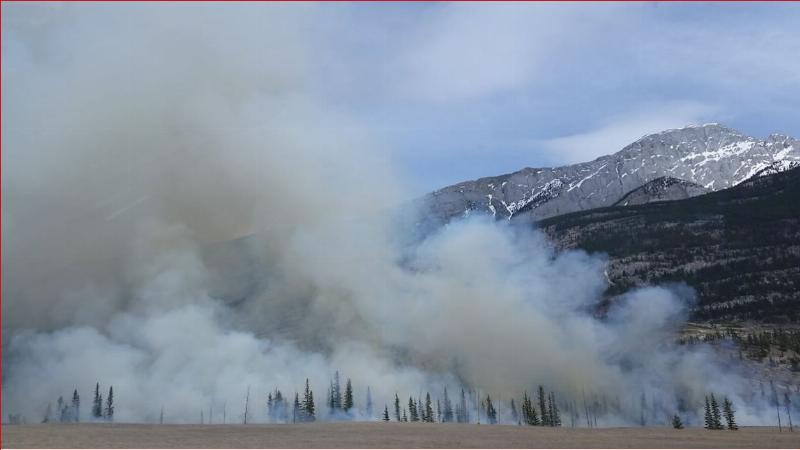


Why can’t the second-largest nation on earth ever get control of its wildfires?
Canada should have had enough practice by now.
Hundreds of fires raged out of control for months in the summer of 2023. And 2024. We got the smoke.
For that matter, why can’t the most populous state in the union do the same?
Maybe for the same reason. Progressive asshats in both places seem to be unable to do literally anything except aggressively police “Islamophobia,” “homophobia,” and “transphobia.” And their green policies may be contributing to the problem, which coincides with their monolithic grip on power.
From an NPR report, posted on Facebook:
Thick, billowing clouds of smoke are sweeping south from wildfires ravaging the central Canadian province of Manitoba into parts of the United States, compromising air quality for millions of Americans across several northern states.
Of course, the NPR report was sure to mention climate change, claiming:
The U.S. has also battled increasingly devastating wildfires over recent years as climate change has made larger wildfires more likely and more intense.
Regarding Canadian wildfires, a CNN article from 2023 reported:
Scientists from the World Weather Attribution initiative – which calculates the role of climate change in extreme weather events – found human-caused climate change more than doubled the likelihood of hot, dry and windy conditions that drove the Quebec fires between May and July, and made this fire-prone weather at least 20% more intense.
Made this fire-prone weather at least 20% more intense? How does fire-prone weather get made (at least 20%) more intense? How is this measured … and by whom?
For that matter, how much more intense can a raging, out-of-control fire consuming hundreds of thousands of acres of forest get?
Friederike Otto, co-founder of something called the World Weather Attribution initiative (and senior lecturer at the Grantham Institute in the UK!) issued this dubious statement:
"Until we stop burning fossil fuels the number of wildfires will continue to increase, burning larger areas for longer periods of time."
Ah, there it is! Fossil fuels bad.
The CNN piece referenced Kira Hoffman, a fire ecologist at the University of British Columbia and the Bulkley Valley Research Centre, who averred that there are many factors that contribute to extreme wildfire seasons, including logging and abandoning Indigenous fire stewardship techniques. (Guess we have to capitalize the ‘I’ in Indigenous.)
Sorry, Kira, not buying that one. Logging removes trees. Oddly enough, things that aren’t there don’t burn. And what the hell is “Indigenous fire stewardship?” I have respect for Indigenous peoples and a love for trees, but, seriously, come on!
As I wrote in a 2023 blog post:
Many of the fires are at least partially the result of leaving too much deadwood and flammable material on forest floors, usually due to ‘environmentalists’ wishes. Of course, more folks live in more areas, and fire detection and reporting are better than in prior eras, too. And, at least in the case of Canada, one gets the impression that an all-out effort to contain these conflagrations hasn’t been made…possibly to drive home the point that global warming is going to be the death of us all, and sooner rather than later. (It wouldn’t stun me if some of the fires were set by those with an agenda.)
A recent study by Danish author and academic Bjorn Lomborg, published in the Wall Street Journal, illustrated a vast disparity between the actual number of wildfires and the attention given them by the mainstream media and politicians.
Lomborg asserted: ‘Climate change hasn’t set the world on fire. It turns out the percentage of the globe that burns each year has been declining since 2001.’
Yet, despite that inconvenient truth, the mainstream media-- and many politicians—insist that there are ever more fires as a direct result of ‘climate change.’ In furtherance of their agenda, reporting on ‘climate change’ has increased by 400% between 2010 and 2020.
We know for a fact that many of the previous Canadian wildfires were deliberately set by arsonists. So, instead of reflexively blaming logging — and oil and gas companies -- for the fires, let’s seek the truth.
I am on vacation in a remote, undisclosed location in northern Minnesota as I write this. The smoke is noticeable, tangible. And I have asthma, so, to use a favorite phrase of progressives, I may be ‘disproportionately affected’ by these wildfires.
I am not a fan of blowing smoke, whether it comes from Canada … or progressive politicians with an agenda.
Image: Pixabay, via Pexels // Pexels License
